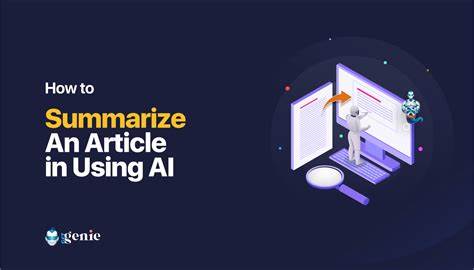
In today’s fast-paced digital world, where information overload is a common challenge, the ability to quickly summarize large texts is invaluable. This is where AI steps in, offering powerful solutions for efficient text summarization. In this article, we will explore the best and free AI tools to summarize text, providing you with insights to choose the right tool for your needs.

Section 1: Understanding AI-Powered Text Summarization
AI-powered text summarization is a transformative technology that uses algorithms to condense large volumes of text into concise summaries. There are two primary types: extractive summarization, which selects key sentences to form a summary, and abstractive summarization, which generates new sentences to capture the essence of the text. The benefits are immense, from saving time to enhancing comprehension, especially in fields like research, journalism, and business.
Section 2: Features to Look for in a Good AI Text Summarizer
When searching for the best and free AI to summarize text, consider these key features:
- Accuracy and Reliability: The tool should provide summaries that accurately reflect the original text’s context.
- Speed and Efficiency: It must handle large volumes of text swiftly.
- User-Friendly Interface: Ease of use is crucial for a smooth experience.
- Multilingual Support: The tool should work with various languages and text formats.
Section 3: Top Free AI Text Summarization Tools
In the realm of free AI tools for text summarization, several notable names stand out:
- Jasper:
- Description: Known for its sophisticated AI algorithms, Jasper offers high-quality extractive summarization.
- Features: User-friendly interface and efficient handling of large text volumes.
- Pros: Ideal for quickly summarizing lengthy documents.
- Cons: Some features might require a premium subscription.
- Quillbot:
- Description: Quillbot is popular for its dual functionality in both paraphrasing and summarizing texts.
- Features: Capable of both extractive and abstractive summarization.
- Pros: Versatile, suitable for both short and detailed summaries.
- Cons: May need multiple iterations for optimal quality.
- Shortly AI:
- Description: Tailored for creative writing, Shortly AI focuses on abstractive summarization.
- Features: Generates creative, engaging summaries.
- Pros: Best for creative and narrative texts.
- Cons: Less suited for technical or academic texts.
- Simplified:
- Description: Designed for content creators, Simplified offers a mix of content creation and summarization.
- Features: Specializes in summarizing articles, blog posts, and social media content.
- Pros: Ideal for digital marketers and content creators.
- Cons: May not excel with technical or academic content.
- Scalenut:
- Description: A new entrant, Scalenut is recognized for its efficiency.
- Features: Clean and intuitive interface for quick summarization.
- Pros: Effective for various text formats.
- Cons: Lacks some advanced features of established tools.
Section 4: How to Choose the Right AI Text Summarizer for Your Needs
Choosing the right tool depends on your specific needs. Consider the volume of text you need to summarize and the level of detail required. Experiment with different tools to see which aligns best with your workflow.
Section 5: Real-World Applications of AI Text Summarization
These AI tools are revolutionizing industries. For instance, in academia, researchers use them to quickly grasp research papers’ key points. In the business world, executives use them to summarize reports and long documents.
Section 6: Future of AI in Text Summarization
The future of AI in text summarization is promising. We can expect to see more advanced features like personalized summarization based on user preferences and integration with other AI systems for a more seamless experience.
Conclusion:
The best and free AI tools to summarize text offer a window into the future of information processing. By choosing the right tool, you can significantly enhance your productivity and understanding of complex texts.
